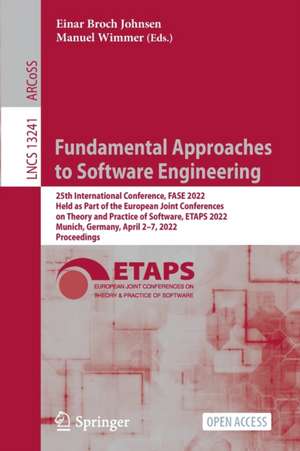Fundamental Approaches to Software Engineering: 25th International Conference, FASE 2022, Held as Part of the European Joint Conferences on Theory and Practice of Software, ETAPS 2022, Munich, Germany, April 2–7, 2022, Proceedings: Lecture Notes in Computer Science, cartea 13241
Editat de Einar Broch Johnsen, Manuel Wimmeren Limba Engleză Paperback – 29 mar 2022
The 17 regular papers presented in this volume were carefully reviewed and selected from 64 submissions. The proceedings also contain 3 contributions from the Test-Comp Competition. The papers deal with the foundations on which software engineering is built, including topics like software engineering as an engineering discipline, requirements engineering, software architectures, software quality, model-driven development, software processes, software evolution, AI-based software engineering, and the specification, design, and implementation of particular classes of systems, such as (self-)adaptive, collaborative, AI, embedded, distributed, mobile, pervasive, cyber-physical, or service-oriented applications.
Din seria Lecture Notes in Computer Science
- 20%
 Preț: 1061.55 lei
Preț: 1061.55 lei - 20%
 Preț: 307.71 lei
Preț: 307.71 lei - 20%
 Preț: 438.69 lei
Preț: 438.69 lei - 20%
 Preț: 645.28 lei
Preț: 645.28 lei -
 Preț: 410.88 lei
Preț: 410.88 lei - 15%
 Preț: 580.46 lei
Preț: 580.46 lei - 17%
 Preț: 427.22 lei
Preț: 427.22 lei - 20%
 Preț: 596.46 lei
Preț: 596.46 lei -
 Preț: 449.57 lei
Preț: 449.57 lei - 20%
 Preț: 353.50 lei
Preț: 353.50 lei - 20%
 Preț: 1414.79 lei
Preț: 1414.79 lei - 20%
 Preț: 309.90 lei
Preț: 309.90 lei - 20%
 Preț: 583.40 lei
Preț: 583.40 lei - 20%
 Preț: 1075.26 lei
Preț: 1075.26 lei - 20%
 Preț: 310.26 lei
Preț: 310.26 lei - 20%
 Preț: 655.02 lei
Preț: 655.02 lei - 20%
 Preț: 580.93 lei
Preț: 580.93 lei - 20%
 Preț: 340.32 lei
Preț: 340.32 lei - 18%
 Preț: 938.83 lei
Preț: 938.83 lei - 20%
 Preț: 591.51 lei
Preț: 591.51 lei - 15%
 Preț: 438.59 lei
Preț: 438.59 lei - 20%
 Preț: 337.00 lei
Preț: 337.00 lei -
 Preț: 389.48 lei
Preț: 389.48 lei - 20%
 Preț: 607.39 lei
Preț: 607.39 lei - 20%
 Preț: 1024.44 lei
Preț: 1024.44 lei - 20%
 Preț: 579.30 lei
Preț: 579.30 lei - 20%
 Preț: 763.23 lei
Preț: 763.23 lei - 20%
 Preț: 453.32 lei
Preț: 453.32 lei - 20%
 Preț: 575.48 lei
Preț: 575.48 lei - 20%
 Preț: 585.88 lei
Preț: 585.88 lei - 20%
 Preț: 825.93 lei
Preț: 825.93 lei - 20%
 Preț: 763.23 lei
Preț: 763.23 lei - 17%
 Preț: 360.19 lei
Preț: 360.19 lei - 20%
 Preț: 1183.14 lei
Preț: 1183.14 lei - 20%
 Preț: 340.32 lei
Preț: 340.32 lei - 20%
 Preț: 504.57 lei
Preț: 504.57 lei - 20%
 Preț: 369.12 lei
Preț: 369.12 lei - 20%
 Preț: 583.40 lei
Preț: 583.40 lei - 20%
 Preț: 343.62 lei
Preț: 343.62 lei - 20%
 Preț: 350.21 lei
Preț: 350.21 lei - 20%
 Preț: 764.89 lei
Preț: 764.89 lei - 20%
 Preț: 583.40 lei
Preț: 583.40 lei - 20%
 Preț: 649.49 lei
Preț: 649.49 lei - 20%
 Preț: 341.95 lei
Preț: 341.95 lei - 20%
 Preț: 238.01 lei
Preț: 238.01 lei - 20%
 Preț: 538.29 lei
Preț: 538.29 lei
Preț: 307.23 lei
Preț vechi: 384.04 lei
-20% Nou
Puncte Express: 461
Preț estimativ în valută:
58.79€ • 61.51$ • 48.84£
58.79€ • 61.51$ • 48.84£
Carte tipărită la comandă
Livrare economică 02-16 aprilie
Preluare comenzi: 021 569.72.76
Specificații
ISBN-13: 9783030994280
ISBN-10: 3030994287
Pagini: 347
Ilustrații: XIV, 347 p. 96 illus.
Dimensiuni: 155 x 235 mm
Greutate: 0.51 kg
Ediția:1st ed. 2022
Editura: Springer International Publishing
Colecția Springer
Seria Lecture Notes in Computer Science
Locul publicării:Cham, Switzerland
ISBN-10: 3030994287
Pagini: 347
Ilustrații: XIV, 347 p. 96 illus.
Dimensiuni: 155 x 235 mm
Greutate: 0.51 kg
Ediția:1st ed. 2022
Editura: Springer International Publishing
Colecția Springer
Seria Lecture Notes in Computer Science
Locul publicării:Cham, Switzerland
Cuprins
FASE Contributions.- Information-flow Interfaces.- A Survey-Based Feature Model for Software Traceability.- Construction of Veri er Combinations Based on Off-the-Shelf Verifiers.- On the Detection of Doped Software by Falsification.- Estimating Worst-case Resource Usage by Resource-usage-aware Fuzzing.- Quantitative Program Sketching using Lifted Static Analysis.- SixthSense: Debugging Convergence Problems in Probabilistic Programs via Program Representation Learning.- Finding Semantic Bugs Fast.- SMC4PEP: Stochastic Model Checking of Product Engineering Processes.- Symbolic Predictive Cache Analysis for Out-of-Order Execution.- PEQtest: Testing Functional Equivalence.- An Institutional Approach to Communicating UML State Machines.- Semantic Code Search in Software Repositories using Neural Machine Translation.- AequeVox: Automated Fairness Testing of Speech Recognition Systems.- SMT-Based Planning Synthesis for Distributed System Reconfigurations.- Semantic Clone Detection via Probabilistic Software Modeling.- QMaxUSE: A Query-based Verification Tool for UML Class Diagrams with OCL Invariants.- Test-Comp Contributions.- Advances in Automatic Software Testing: Test-Comp 2022.- FuSeBMC v4: Smart Seed Generation for Hybrid Fuzzing (Competition Contribution).- VeriFuzz: Good Seeds for Fuzzing (Competition Contribution).
Textul de pe ultima copertă
This open access book constitutes the proceedings of the 25th International Conference on Fundamental Approaches to Software Engineering, FASE 2022, which was held during April 4-5, 2022, in Munich, Germany, as part of the European Joint Conferences on Theory and Practice of Software, ETAPS 2022.
The 17 regular papers presented in this volume were carefully reviewed and selected from 64 submissions. The proceedings also contain 3 contributions from the Test-Comp Competition. The papers deal with the foundations on which software engineering is built, including topics like software engineering as an engineering discipline, requirements engineering, software architectures, software quality, model-driven development, software processes, software evolution, AI-based software engineering, and the specification, design, and implementation of particular classes of systems, such as (self-)adaptive, collaborative, AI, embedded, distributed, mobile, pervasive, cyber-physical, or service-oriented applications.
Caracteristici
This book is open access, which means that you have free and unlimited access
